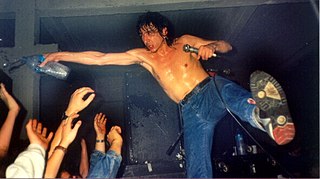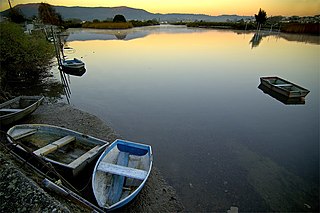
Basque music refers to the music made in the Basque Country, reflecting traits related to its society/tradition, and devised by people from that territory. While traditionally more closely associated to rural based and Basque language music, the growing diversification of its production during the last decades has tipped the scale in favour of a broad definition.

La Polla Records was a punk rock band from the Basque Country, formed in 1979 in Salvatierra/Agurain, a small town in Álava, Spain. Its founders were Evaristo Páramos "Evaristo" on vocals, Maleguin on bass, Fernandito on drums and Txarly and Sumé on guitars. The name was somewhat controversial because in Spanish, "polla" is vulgarly slang for "cock, penis". The lyrics of the band harshly criticized fascism, militarism, capitalism, and catholicism. La Polla Records has been very influential in the Spanish-language punk scene.

Negu Gorriak were an underground Spanish group from the Basque Autonomous Community. Their musical style combines various styles of rock music such as hardcore punk, hip-hop, ska, and reggae, although it is impossible to separate the band from its political ideology and its identification with the Basque Country and its language (Euskara).

Fermin Muguruza is a Basque rock musician, singer, songwriter, producer, record label manager, and co-founder of the ska punk band Kortatu, active from 1983 to 1988, and of the crossover group Negu Gorriak, active from 1990 to 1996.

Mikel Laboa Mancisidor was one of the Basque Country's most important singer-songwriters.

Eskorbuto was a Spanish punk rock band from Santurtzi, Greater Bilbao, Basque Autonomous Community, that formed in 1980. They have been one of the most influential bands for Spanish and Latin American punk rock. They are known for their strong attitude and crude lyrics. They were one of the first bands to perform punk with lyrics in Spanish. Eskorbuto is a modified word taken from escorbuto . Along with the band La Polla Records, Eskorbuto has been very influential in the Spanish rock and punk scene.
Spanish rock is the term used for the variety of rock music produced in Spain. Most bands formed in Spain have sung in Spanish, but many others have sung in English, French and Italian, in addition to the other languages spoken in Spain, such as Catalan, Galician, Basque, Aragonese, and Asturian.

FM 99.00 Dub Manifest is a studio album from Basque artist Fermin Muguruza. It was released in 2000 and produced by Esan Ozenki.

Brigadistak Sound System is a studio album from Basque artist Fermin Muguruza. It was released in 1999 and produced by Esan Ozenki Records.

Reincidentes is a Spanish rock/punk rock band. They were formed in the 1980s as Incidente Local, by Manuel Pizarro on drums, Juan Barea on guitar, and Fernando Medina on bass and vocals. They performed their first live concert in 1987 at University of Seville. After they became finalists at a local rock contest and were joined by sax player José Luis Nieto, they recorded their self-titled debut album in 1989 released by '"Discos Trilita". After signing up to the "Discos Suicidas" label and participating in Seville Expo '92, they started touring Central America. Later, Selu left the band and Finito de Badajoz became the new guitarist. In 1997, the band signed to BMG and shortly thereafter their live album Algazara became their first gold record in Spain in 2000.

Cicatriz was a punk rock band from the Basque Autonomous Community (Spain) formed in 1983. The band had a big significance for the Basque Radical Rock. The band reached a huge degree of influence in Spanish punk, alongside other bands like La Polla Records, Kortatu and Eskorbuto, which rose to fame in the 80's underground scene.

Boikot is a Spanish left-wing punk rock band.
B.A.P.!! was a Basque-language hardcore punk from Andoain, Basque Autonomous Community, Spain, formed in 1984. The band's name BAP had various explanations including; Babarruna ta Aza Popularra!!, and Brigada Anti Policial. The name was soon shortened to just B.A.P.!!, and cited as BAP.

Karamelo Santo is a Latin rock band from Mendoza, Argentina. Formed in 1992 for Goy Karamelo, they released their first album, La Kulebra in 1995. Since then, they have released nine more albums. The single "Que No Digan Nunca" is probably their best-known song. It was used on the soundtrack for the movie Caño Dorado.

Joseba Sarrionandia Uribelarrea is a Basque writer who has published a large number of books of poetry and short stories, as well as novels. He has been awarded on numerous occasions for his work, and is nowadays a respected literary personality in the Basque Country.

Sorkun is a Basque singer. She has recorded two solo albums, and formed part of the punk-rock band Kashbad during the 90s. She has also recorded with other groups such as Negu Gorriak and Flitter, and has collaborated with Fermin Muguruza.

Goy Karamelo is an Argentinian folk singer of Jewish origin. He sings in Spanish, English, and occasionally in other languages. Karamelo began his musical career with Perfectos Idiotas, an Argentinian group that combined several musical styles and languages. He founded the band Karamelo Santo in 1993, and became a solo artist after its breakup in 2009.

Basque Radical Rock, was a musical genre born in the Southern Basque Country at the beginning of the 1980s and, although there was no specific event, it is considered to have ended in the last years of the decade. Basque Radical Rock bands were particularly influenced by punk bands like Sex Pistols and The Clash. It was considered an underground movement, born in opposition to the values proclaimed by Francisco Franco and spread by thousands of people who felt with the Spanish transition to democracy their Basque national and social aspirations were betrayed.

R.I.P. was a hardcore punk group from Mondragón, Basque Autonomous Community (Spain), and were part of the Basque Radical Rock musical movement in the early 1980s. By 2014, three of the band's classic four members — lead singer Karlos "Mahoma" Agirreurreta, bassist "Portu" Mancebo and guitarist Jul Bolinaga — had died.

Mugalari is a Basque word used to designate people who help others cross the border between France and Spain, mainly for political reasons. The term is a combination of the words "muga" (border) and "-lari", and it refers to people living in the border, and by extension also to smugglers.
















